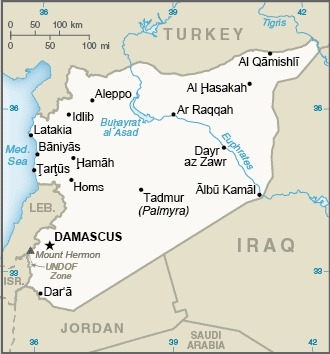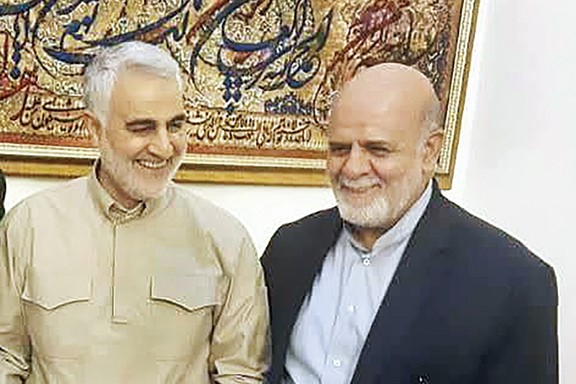
Syria map showing major cities as well as parts of surrounding countries and the Mediterranean Sea.
“What were initially infiltration and smuggling attempts have evolved into full-fledged armed clashes, with the explicit objective of forcibly crossing the border by targeting Jordanian border guard forces.”
Jordanian authorities are signaling growing alarm over the willingness of smugglers from Syria to use armed force to circumvent tightened Jordanian border security. This comes at a delicate moment for the kingdom due to Israel’s campaign in Gaza, given Jordan’s large Palestinian population and concerns that Jordan could become a conduit for weapons to be smuggled into the West Bank. Smuggling has long been an economic mainstay for communities along the Syria-Jordan border, especially after the Syrian government lost control of key border crossings during the Syrian civil war. Since then, smuggling across the border has become increasingly institutionalized and largely controlled by networks within the Syrian Army’s 4th Division, many of them linked to Iran and Lebanese Hezbollah. Concerns that potentially hostile armed groups control smuggling routes from Syria has led Jordan to tighten security across the shared border, in turn leading smugglers to seek new ways to circumvent border security. Recent reports and statements suggest that smuggling networks in Syria are increasingly willing to use force to get across the increasingly monitored border.
The first accompanying excerpt, from the Syrian opposition news website alsouria.net, explains how small-scale smuggling has “evolved into full-fledged armed clashes, with the explicit objective of forcibly crossing the border by targeting Jordanian border guard forces.” The article adds that Jordanian authorities are concerned about weapons being smuggled into the kingdom. Particularly noteworthy was a mid-December firefight in which a Jordanian border guard was killed, weapons were seized, and an airstrike took place on a purported smuggling safehouse inside Syrian territory, attributed to but not claimed by the Jordanian military. The second excerpt, also from alsouria.net, details the handful of weapons seized during the incident—a handful of rocket propelled grenades, mines, and sniper rifles. Although troubling from a Jordanian perspective, the small number of weapons were likely not part of the primary cargo being smuggled, but rather used by smugglers to force their way across the border. Instead, as the excerpt notes, the primary cargo was hashish and five million Captagon pills, likely destined for Saudi Arabia. The production and export of Captagon, a synthetic amphetamine-like substance—produced in Lebanon and Syria and consumed heavily in Gulf countries—has become a key part of Syria’s wartime economy.[i] The third accompanying excerpt, from the English-language Arab Weekly, claims that Jordan is inflating the threat from smugglers to “secure assistance and stronger cooperation” from Gulf countries, most prominently Saudi Arabia, the destination for much of the contraband. If evidence emerges that weapons are being smuggled across the border, concerns that these weapons could end up in the hands of Shia groups in Saudi Arabia would likely elicit a response from Riyadh. Smuggling along the Syria-Jordan border peaks in the cold winter months, due to the dense fog that often envelops the area at night, hampering visibility for those seeking to curb smugglers. While the seasonal uptick is expected, the increasing willingness of smugglers to engage in firefights with Jordanian border guards is concerning. The failure of increased Jordanian border security measures is a latent concern for Amman. Given that Iran and Hezbollah exert substantial influence over smuggling networks in Syria, the Syria-Jordan border may well become an additional regional flashpoint.
Sources:
“Syrian-Jordanian Border Battle Ends With Airstrikes, Amman Hints at Iran’s Involvement,” alsouria.net (Syrian opposition news website) via The Syrian Observer (Syrian news aggregator), 20 December 2023. https://syrianobserver.com/news/86785/syrian-jordanian-border-battle-ends-with-airstrikes-amman-hints-at-irans-involvement.html
What were initially infiltration and smuggling attempts have evolved into full-fledged armed clashes, with the explicit objective of forcibly crossing the border by targeting Jordanian border guard forces…
This form of military operations and clashes underscores the significant challenges confronting Jordan due to the Syrian regime and the escalating influence of Iran and Hezbollah in Syria. Despite the security measures and military tightening implemented by Amman along the Syrian-Jordanian border, smuggling operations have not only persisted but have also intensified. A particularly alarming security threat arising from these clashes is the initiation of arms and rocket smuggling operations, underscoring the extent of Iranian pressure on Jordan.
“حرب وقتلى” على الحدود السورية الأردنية..رسائل وتحذيرات وخيارات مفتوحة
“‘War and death’ on the Syrian-Jordanian border… messages, warnings, and open options,” alsouria.net (Syrian opposition news website), 19 December 2023.
The Jordanian army seized about five million Captagon pills and about 13,000 hashish palms, in addition to 4 Rocket Launcher missiles, 4 RPG missiles, 10 anti-personnel mines, a G3 sniper rifle, and a M-16 type rifle equipped with a sniper scope.
“Is Jordan inflating smugglers’ threat on border with Syria?” The Arab Weekly (London-based Arabic-language weekly), 19 December 2023. https://thearabweekly.com/jordan-inflating-smugglers-threat-border-syria Observers believe however that Jordan is exaggerating the developments in the border region, pointing out that the phenomenon of active gangs is not new and that most countries suffer from it. Jordan is not an exception, especially since the neighbouring country, Syria, is gripped by security chaos, observers told The Arab Weekly. They suggest the exaggeration may be related to Jordan’s desire to present itself regionally, especially to the Arab Gulf countries, as the first line of defence for regional security. The aim, according to observers, is to secure assistance and stronger cooperation.
Notes:
[i] For more on the Captagon trade, see: Lucas Winter, “Pharmaceutical Drugs and the Syrian War,” OE Watch, December 2015. https://community.apan.org/wg/tradoc-g2/fmso/m/oe-watch-past-issues/195975 and Lucas Winter, “Syria Becoming Center of Illicit Drug Production and Export to Europe and Arabian Peninsula,” OE Watch, January 2021. https://community.apan.org/cfs-file/__key/telligent-evolution-components-attachments/13-21393-00-00-00-38-05-55/2021_2D00_01_2D00_01-Syria-Becoming-Center-of-Illicit-Drug-Production-_2800_Winter_2900_.pdf?forcedownload=true
Image Information:
Image: Syria map showing major cities as well as parts of surrounding countries and the Mediterranean Sea.
Source: CIA Factbook, https://www.cia.gov/the-world-factbook/countries/syria/map Attribution: Public Domain

